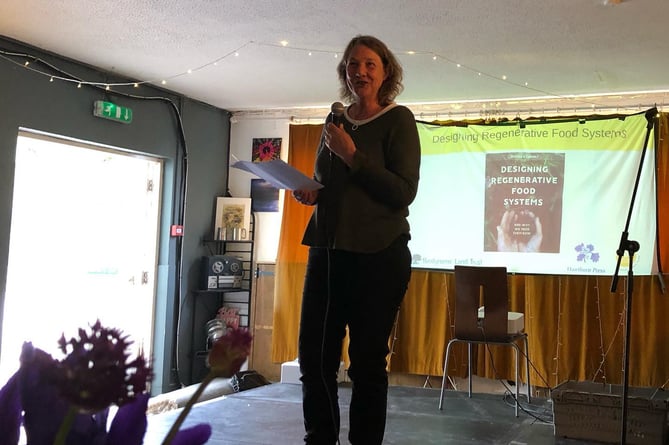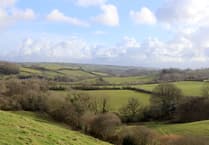In the face of rocketing fertilizer and oil costs, local farmers, millers and community groups shared good news stories about their aims to develop an alternative regenerative local food economy.
The Dartington-based Apricot Centre and local poet Matt Harvey recently hosted the Celebration of Regenerative Agriculture at the New Lion Brewery.
Biodiversity farmer Marina O’Connell of Huxhams Cross Farm explained how she uses a range of composting and green manures instead of artificial fertilisers to regenerate her soil.
Opening the celebration, Rob Hopkins of Transition Towns, said: “We need miraculous regenerative agriculture stories like Huxhams Cross Farm.
“We don’t need a time machine to reimagine farming because the future is happening here in Totnes already.”
Rachel Phillips, the Apricot Centre’s education and wellbeing manager, talked about the farm apprentice selection process for the Apricot School of Regenerative Land Based Studies.
Philip Franses explained the transformation of 25 acres of the neighbouring Glebe Fields, which involves regenerating the soil and water systems to prevent flooding at Week, capture carbon and produce healthy food.
Dan Mifsud of The Almond Thief talked about the bakery’s Reclaim The Grain project run in collaboration with the Apricot Centre, Old Parsonage Farm and Dartington Mill.
The project, which launched in Dartington, aims to de-commodify and re-localise basic food ingredients such as flour, oats and other grains by encouraging small-scale farmers to grow resilient varieties using low carbon and biodiverse methods.
This in turn will help make their businesses sustainable offering a price that reflects the costs of production.
The grains are dried, cleaned, milled and flaked all within one mile of the farms where they are grown.
The mill works at low temperatures maintaining the nutritional integrity of the grain.
Professional and home bakers can source these fresh local grains to make healthy and delicious artisan bread, pastries, cakes, biscuits, granola and muesli.
And Apricot’s Mark O’Connell talked about the centre’s Communities of the Soil platinum jubilee permaculture project which aims to support minority communities in Stonehouse, Plymouth by creating spaces to grow food.
Martin Large, founding director of the Biodynamic Farmland Trust, said: “Given farmers currently face a perfect storm of rocketing fertiliser and energy costs, as a timely alternative Dartington farmer Marina O’Connell is much in demand for designing regenerative farms, food systems and farm businesses.
“A recent impact study of her Huxhams Cross Farm in her new book shows over seven years the impacts of increased soil health, biodiversity, 27 direct and indirect jobs, profitable farm businesses and striking carbon capture on just 38 acres of hitherto marginal land.
“Her farm apprenticeship scheme develops the young farmers we need for our food security.”




